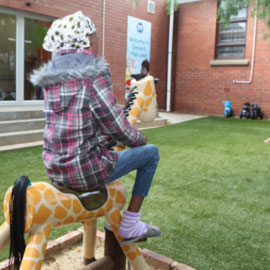
When Kelopegile Eliazar Magopane held her baby girl, Zodwa for the first time six months ago, she couldn't wait to go back home for the whole family to celebrate the arrival of a new member.
However, her tears of joy were short lived. Instead of seeing Zodwa playing around with her four siblings, Magopane aged 42 from Thembalihle, near Orange Farm spends most of her time at Chris Hani Baragwanath Academic Hospital visiting her daughter.
Zodwa was admitted at the hospital four months ago after being diagnosed with Neuroblastoma cancer, a rare type of cancer that almost always occurs in infants and young children.
It is a solid tumor (a lump or mass caused by uncontrolled or abnormal cell growth), which is formed by special nerve cells called neuroblasts. Normally, these immature cells grow and mature into functioning nerve cells, but in neuroblastoma, they become cancer cells instead.
Neuroblastoma is the most common type of cancer in infants. Although neuroblastoma sometimes forms before a child is born, it isn't usually found until later, when the tumor begins to grow and affect the body.
Zodwa is among the kids admitted at the newly built Pediatric Oncology Ward, recently opened at Chris Hani Baragwanath for children suffering from various forms of cancers.
The two wards, 43 and 44 admits children from zero to 19 years. Each ward has 20 beds, one of them caters for children between zero and seven years and the other admits patients aged between seven and 19 years.
The children at the ward are not only from Soweto but also from peripheral hospitals and outside the province, even outside the countrie like Swaziland and Gaborone. They receive services including counselling, chemotherapy, blood and blood product transfusion.
The ward has a duty room, treatment room, nurses' station, isolation room, counselling room, as well as play and dining area.
Through the assistance of the Childhood Cancer Foundation of South Africa (CHOC), which unveiled the newly revamped ward, the hospital also provides accommodation, food and transport to patients and their parents.
CHOC also provides free accommodation, which is fully furnished rooms and food to children's parents coming from far to ensure that their needs are met and to ensure they don't travel long distances, when coming to the hospital. The accommodation is a few kilometres away from the hospital in Diepkloof and transport is provided for them every morning and afternoons.
Although Zodwa cannot turn herself in bed and make sounds like normal kids of her own age, Magopane says she finds comfort from the support she gets from ward staff members, whenever she is feeling down.
"I used to ask myself why me, but then I console myself when seeing other parents with kids in the same situation like Zodwa. The support from nurses also helps me a lot, if I'm not feeling well, I'll seat down with them, pour my heart out and they comfort me," Magopane tells SAnews during the visit at the ward.
Ward Operational Manager Sylvia Nonhlanhla Mdluli acknowledges the improvement from the old ward, which had one TV room shared by all patients in a dining area, unlike the new wards, where each cubicle has its own TV.
"It's motivating to work in the environment, which is conducive, the procedure room is very calm and have beautiful walls. The old ward was overcrowded and became smaller by day. We really needed the counselling room because most of the time we break the news (to parents) and some of them are bad and we have to sit and calm them down," says Mdluli.
CHOC Johannesburg Chairperson Nagm Azar says they chose to assist Bara instead of constantly complaining of the conditions of the hospital and urged the public to get involved in organisations such as CHOC by either volunteering their time or money.
"You can help to be partners with our doctors, nurses and government to increase the longevity of these children we must take that stand," said Azar.
According to CHOC, the incidence of childhood cancer worldwide is 150 in a million, in South Africa, one in 600 children is affected by cancer before the age of 16.
The encouraging news is that if diagnosed early, 70% - 85% of children can be cured.
Childhood cancers require special pediatric treatment by a pediatric oncologist and comprise of chemotherapy, surgery or radiation.
In South Africa, less than half of the children are diagnosed early enough and reach a treatment centre in time. Many are diagnosed too late with an advanced stage of cancer and treatment has less chance of success, while half are never diagnosed and so receive no treatment. - SAnews.gov.za


